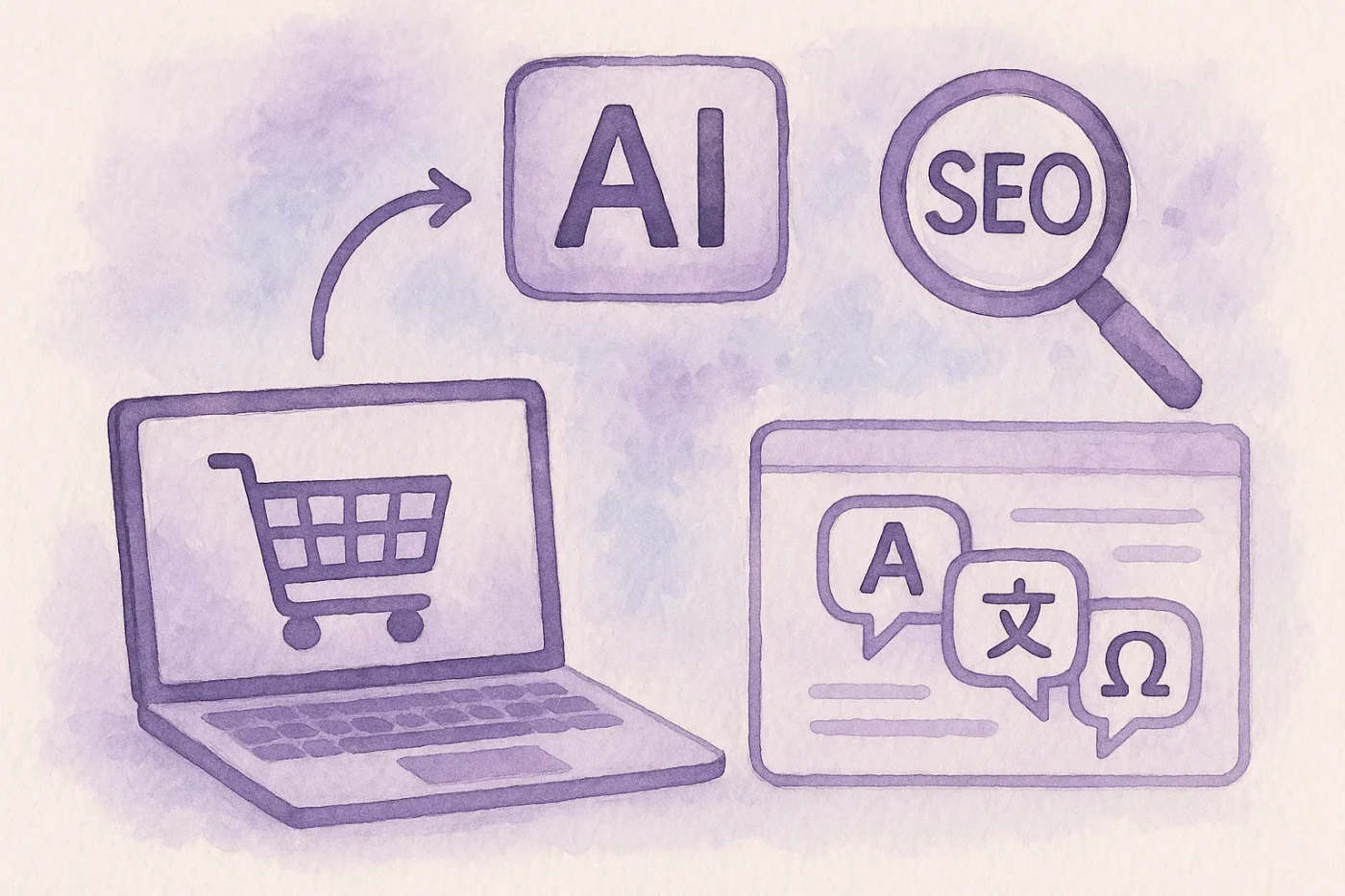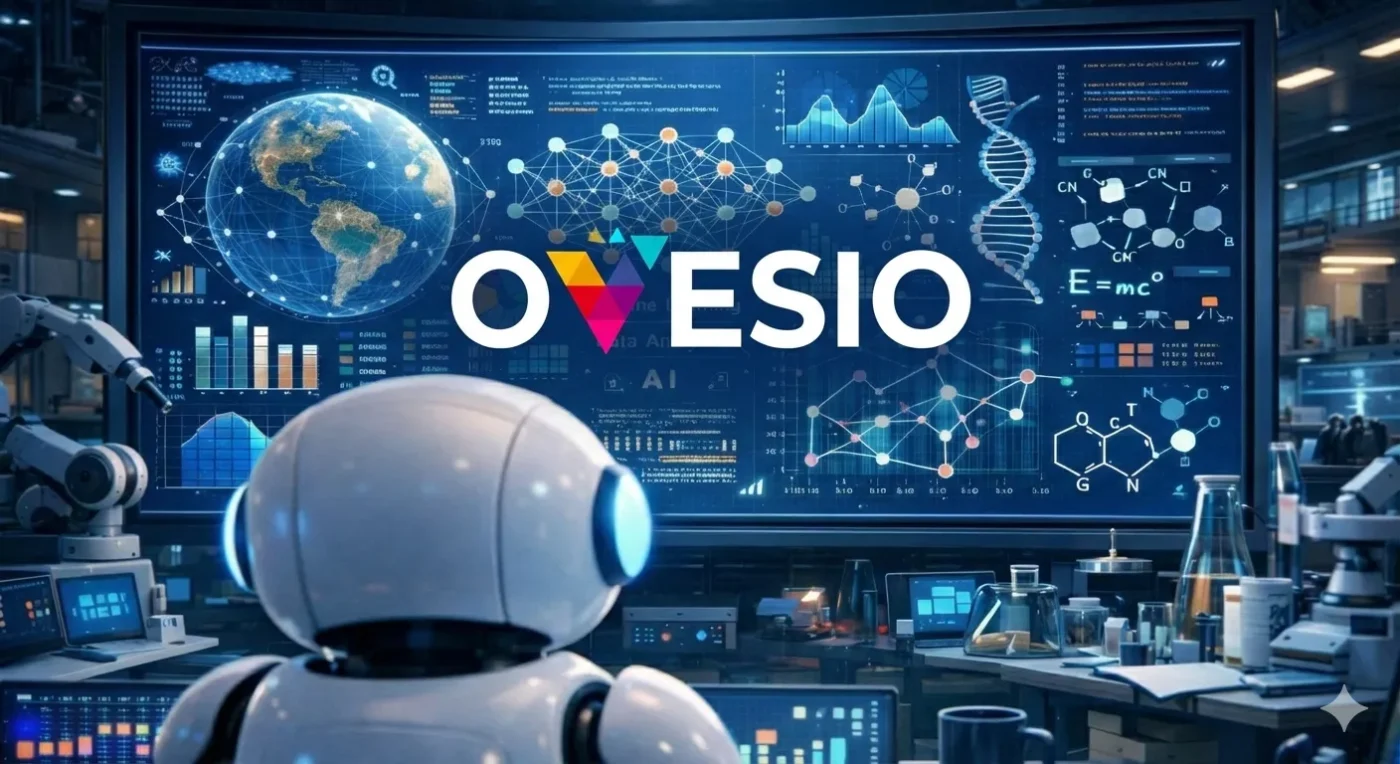How E-Commerce AI Powers Better SEO with Multilingual Content

Once upon a time, multilingual content (with SEO) was a laborious tangle of translation tools, human editors, and spreadsheets full of hreflang tags.
Fast-forward to now: artificial intelligence has entered the arena, and it’s not just helping; it’s transforming the entire game.
AI is reshaping how e-commerce businesses approach multilingual SEO.
With the growing demand for personalized, localized shopping experiences across borders, brands need more than just translated text, they need nuanced, culturally-aware, search-optimized content at scale.
That’s where e-commerce AI steps in: streamlining everything from content creation to keyword strategy, while ensuring your digital storefront resonates across languages and continents.
This article explores how AI enhances multilingual content creation, optimization, and scalability.
It unlocks global reach and better search rankings.
Whether you’re a boutique going cross-border or an enterprise brand going worldwide, understanding this new wave of AI-driven SEO is non-negotiable.
Smarter Multilingual Content Creation at Scale
Ask any marketer: translation ≠ localization.
AI-powered content engines know the difference, and more importantly, they execute on it.
At the core of this shift are neural machine translation (NMT) and large language models (LLMs), technologies that go far beyond literal word swaps.
Instead of producing awkward, stilted language, NMT & LLMs read context, pick up on idioms, and deliver fluid, native-sounding translations that feel human.
That’s crucial when your product descriptions, landing pages, or checkout flows need to strike the right cultural tone instantly.
What used to take weeks of back-and-forth with translators can now be turned around in hours.
AI enables fast, consistent localization of product catalogs, blog content, and metadata, without compromising quality. It remembers tone, applies brand-specific vocabulary, and ensures that a cheeky campaign slogan in London doesn’t turn into an awkward misfire in Tokyo.
But perhaps the most powerful upgrade AI brings is cultural adaptation at scale.
E-commerce AI systems learn from regional feedback and user behavior to tailor content to local norms, search intent, and even legal requirements.
Want to launch your skincare brand in Germany and Brazil simultaneously? AI makes sure your messaging doesn’t just get translated, it gets understood.
And here’s the kicker: AI helps brands maintain a consistent global voice while respecting local nuance.
No more sounding robotic in one language and overly casual in another.
Your message stays clear, your tone stays on-brand, and your business stays relevant, wherever your customer happens to be reading from.
AI-Driven Keyword Strategy & Technical SEO
Translation might get your message across, but it won’t get you to the top of international SERPs.
That’s where AI flips the switch from multilingual to multirelevant.
Instead of simply translating English keywords into Spanish or Mandarin, AI tools discover high-ranking search terms unique to each region and language.
These tools tap into local search trends, user queries, and competitor data to surface what people are actually searching for.
Not just what your English SEO team thinks they’re searching for. The result? You optimize for intent, not just language.
On the technical front, AI becomes your tireless web architect. It automates hreflang tag implementation, ensuring that search engines know which version of your site to serve by geography and language.
No more confusing crawlers, or your customers.
Then there’s localized metadata.
Titles, meta descriptions, alt tags, all dynamically generated and optimized for regional relevance and click-through performance. AI doesn’t just translate your metadata; it tailors it, aligning with local tone and search behavior.
Worried about duplicate content across dynamic pages or endless product filters?
AI has that covered too.
It analyzes faceted navigation to determine which variations (size, color, model) deserve SEO attention, and which ones are diluting your ranking.
This not only avoids penalizations from duplicate content, but also ensures your most important pages get indexed, ranked, and seen.
Ultimately, this is about search behavior alignment.
AI doesn’t treat international SEO as an afterthought. It reads local SERPs like a native and adapts your content strategy accordingly, so whether your customers are in Berlin, Bangkok, or Buenos Aires, your store shows up exactly where and how it should.
Continuous Optimization & Global Expansion
Launching multilingual content is one thing, keeping it optimized is another.
This is where e-commerce AI truly earns its stripes: continuous performance analysis at a scale no human team could manage.
AI platforms track rankings, click-through rates, and conversions across every regional market, providing real-time visibility into what’s working and what needs a tune-up.
Your French-language landing page dropping in organic visibility? AI will flag it.
Your Japanese product descriptions outperforming expectations? AI will tell you why.
These tools don’t just monitor; they act.
By analyzing user signals and competitive shifts, AI suggests content updates and keyword refreshes based on what’s trending or underperforming, keeping your site agile in fast-moving international markets.
Beyond content, AI enhances the broader localized user experience.
From multilingual chatbots that sound like native speakers to product descriptions and customer support FAQs that feel hand-crafted for each locale, AI enables seamless, frictionless interactions that build trust, and conversions.
And yes, it scales. AI isn’t replacing humans, it’s partnering with them.
With a hybrid AI-human model, you get the speed and cost-efficiency of automation, plus the nuance and cultural integrity that only human editors can ensure.
This means you can expand into new regions quickly, without ballooning your marketing team or budget.
In short, AI doesn’t just localize your content. It powers a smarter, leaner, more responsive global SEO strategy, one that grows with your ambition.
Right now the best opportunity for Scaling E-Commerce Stores is Europe, and here’s why: How E-Commerce AI and Translation Unlock the European Market and now with multilingual ai content, it’s easier than ever.
Conclusion
AI has redefined what’s possible in multilingual e-commerce SEO.
From generating culturally fluent content to optimizing technical elements like metadata and hreflang tags, AI empowers brands to localize faster, rank higher, and scale smarter.
As global consumer demand continues to diversify, multilingual SEO is no longer a luxury, it’s a competitive necessity. And with AI, it becomes not just feasible, but efficient and strategic.
The brands that succeed tomorrow will be the ones that speak to everyone, everywhere, with clarity, cultural intelligence, and search precision.
The future of global e-commerce? It’s multilingual, AI-driven, and already here.
FAQ: Multilingual SEO & AI in E-Commerce
1. Why is multilingual SEO important for e-commerce?
To capture organic traffic from non-English-speaking markets, boost search visibility across regions, and drive higher international conversions through localized experiences.
2. Can AI handle complex language and cultural differences?
Yes. Today’s AI uses natural language processing (NLP), machine learning feedback loops combined with large language models (LLMs) to produce content that’s not just linguistically correct but culturally and contextually accurate.
3. Is AI alone enough for high-quality multilingual SEO?
Not entirely. AI provides speed, scale, and structure, but human oversight ensures the final output aligns with your brand tone, meets legal standards, and resonates deeply with local audiences.
4. How does AI improve keyword research across languages?
AI doesn’t just translate keywords, it analyzes real search behavior across regions to find high-performing local search terms, helping you optimize for what global customers are actually looking for.
5. What are the biggest cost-saving benefits of using AI for multilingual SEO?
AI reduces reliance on manual translation, automates technical SEO setup, and accelerates content rollout, cutting time-to-market and operational expenses while expanding global reach.





